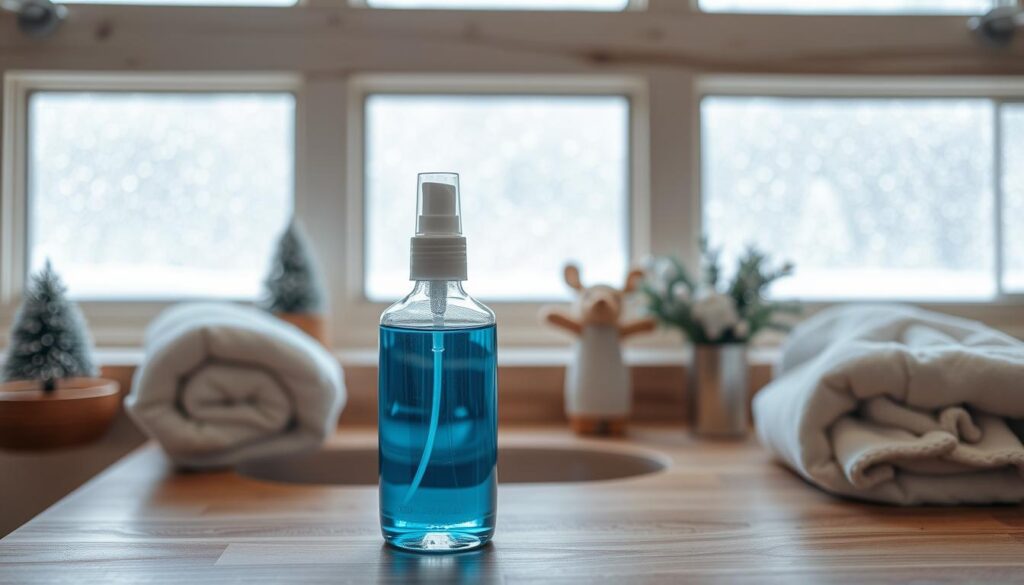When winter hits, many of us face the common cold. There’s no cure, but some remedies can help you feel better fast. But what really works, and what’s just a myth? Let’s look at the quick cold relief strategies that can fight winter illnesses and get you moving again.
Key Takeaways
- Drinking water, juice, clear broth, and warm lemon water with honey can help loosen congestion and prevent dehydration
- Rest is key for healing, so get plenty of sleep and avoid hard activities
- Over-the-counter meds like decongestants, antihistamines, and pain relievers can help, but use them carefully
- Natural remedies like honey, saltwater gargles, and warm liquids can also offer relief
- Good hygiene, like covering coughs and sneezes, and washing hands often, can stop germs from spreading
Stay Hydrated: Drink Plenty of Fluids
When you’re battling a cold, staying hydrated is crucial. Water, juice, clear broth, and warm lemon water with honey can all help loosen congestion and prevent dehydration. It’s important to avoid alcohol, coffee, and sugary drinks, as they can actually worsen dehydration. Sipping warm liquids like tea or soup can also soothe the throat and ease symptoms.
Hydration Tips for Cold Relief
- Drink plenty of water throughout the day to stay hydrated.
- Try warm lemon water with honey to help soothe a sore throat and thin out mucus.
- Opt for clear broths and soups to stay hydrated and nourished.
- Avoid alcohol, coffee, and sugary beverages, as they can contribute to dehydration.
Staying hydrated is key to managing cold symptoms and promoting healing. By drinking the right fluids, you can help loosen congestion, soothe your throat, and prevent dehydration during the recovery process.

“Proper hydration is essential for fighting off a cold and speeding up the recovery process. Drink plenty of fluids, especially warm ones, to help thin out mucus and soothe your throat.”
Get Enough Rest
When you have a cold, your body needs rest to heal and fight off the virus. Aim for 8-10 hours of sleep each night. Also, avoid doing too much physical activity while you’re recovering. This can weaken your immune system and make your illness last longer.
Studies show that not getting enough sleep can make you more likely to catch a cold. People who sleep less than 5 hours a night are 4.5 times more likely to get sick. Colds usually last 7 to 10 days, with symptoms taking a few days to appear fully.
To help your body rest and recover well, try these tips:
- Prioritize sleep and aim for 8-10 hours per night
- Avoid strenuous activities and physical exertion
- Listen to your body and take breaks as needed
- Drink plenty of fluids to stay hydrated
- Eat a balanced, nutrient-rich diet to support your immune system
Remember, resting and recovering is key to beating a cold and avoiding more problems. By taking care of your body, you can heal faster and feel better sooner.

“Sleep is the best medicine for a cold, as it allows your body to focus its energy on fighting off the virus and healing.”
Soothe a Sore Throat
A sore throat is common in the cold season. People spend more time indoors, making it worse. There are many ways to get sore throat relief.
Gargle with Warm Saltwater
Gargling with warm saltwater can soothe a sore throat. It reduces swelling and inflammation. Do this several times a day for the best results.
Suck on Lozenges or Hard Candy
Sucking on lozenges or hard candy can soothe a sore throat. But, don’t give them to kids under 6 because of choking risks.
Sip on Warm Liquids
Drinking warm liquids like tea or lemon water with honey helps. It loosens mucus and keeps the throat moist. This relieves scratchiness and pain.
These remedies won’t cure a viral sore throat but can help manage discomfort. A sore throat from a virus usually lasts 4-5 days. Staying hydrated is crucial for recovery.

How do you get rid of a cold in the winter fast?
There’s no magic cure for the common cold, as it’s caused by viruses. But, there are ways to find quick relief and maybe even make it go away faster. Drinking lots of water, resting well, using medicines, trying natural remedies, and keeping clean can help you feel better quickly.
Stay Hydrated
Drink water, juice, clear broth, and warm lemon water with honey. These can help loosen up your stuffy nose and keep you from getting dehydrated. Stay away from alcohol and caffeinated drinks, as they dry you out.
Get Sufficient Rest
Your body heals when it rests. So, sleep a lot and don’t do too much while you’re sick. Research shows that 7-9 hours of sleep a night can boost your immune system and help you recover faster.
Try Over-the-Counter Remedies
For adults and kids over 5, decongestants, antihistamines, and pain relievers like acetaminophen or ibuprofen can help. They can ease stuffy noses, sneezing, and headaches. Just remember to follow the instructions on the package.
Explore Natural Remedies
Natural options like honey, saltwater gargles, and warm drinks can soothe a sore throat or cough. Supplements like echinacea and vitamin C might also help shorten your cold.
Practice Good Hygiene
When you cough or sneeze, cover your mouth and nose. Wash your hands often and avoid spreading germs. This helps keep your cold from getting worse and stops you from making others sick.
By using these tips, you can find fast relief and get over your winter cold sooner. Remember, while colds are common, see a doctor if your symptoms get worse or last too long.

Use Saline Nasal Sprays or Drops
Saline nasal sprays or drops are a good choice to ease nasal congestion from the common cold. They thin out mucus and remove irritants and germs from your nose.
Benefits of Saline Nasal Sprays and Drops
- Most over-the-counter saline nasal sprays are isotonic, meaning they have the same salt concentration as your body’s fluids.
- Some studies suggest that hypertonic saline (higher salt concentration) may provide better improvement in nasal symptoms compared to isotonic solutions.
- Saline nasal sprays and rinses can help remove pollen from nasal linings, providing relief during allergy seasons.
- Doctors often recommend using saline spray to cleanse the nose before applying nasal steroid sprays for better effectiveness.
Making your own saline solution at home is simple. Just mix 3 teaspoons of non-iodized salt with 1 teaspoon of baking soda in 8 ounces of water.
Considerations for Saline Nasal Products
- Side effects can include a stinging or burning sensation, nasal irritation, and itching.
- Some preservatives in saline nasal sprays may cause allergic reactions in certain individuals.
- Daily use of saline nasal spray is generally safe for adults, but you should consult a doctor before using it for small children under 4 years old.
While saline nasal sprays and drops can provide relief, it’s important to follow usage instructions and not overuse them. Decongestants, whether over-the-counter or prescription, should be limited to no more than 3 days of use to prevent the “rebound effect” of worsening congestion.

Saline nasal sprays and rinses can be a helpful addition to your cold and allergy management toolkit. They offer a safe, non-medicated way to thin mucus and clear nasal passages. Be sure to consult your healthcare provider if symptoms persist or worsen.
Try Over-the-Counter Medications
For adults and kids over 5, over-the-counter cold medicines can help. Decongestants like Sudafed reduce nasal and sinus congestion. Antihistamines, such as Benadryl, can ease sneezing and a runny nose.
Pain relievers like acetaminophen or ibuprofen can lower fever, headaches, and body aches. But, use these medicines carefully, especially in young children. Antibiotics don’t work for colds because they’re caused by viruses, not bacteria.
Don’t take too much acetaminophen, as it can harm your liver. Antihistamines might not work as well on day three or later. They can also cause dry mouth and drowsiness.
Cough suppressants and expectorants help with different coughs. Multi-symptom formulas combine these ingredients.
| Medication Type | Purpose | Example Brands |
|---|---|---|
| Decongestants | Reduce nasal and sinus congestion | Sudafed, Sudafed PE |
| Antihistamines | Alleviate symptoms like sneezing and runny nose | Benadryl, Claritin, Zyrtec |
| Pain relievers | Reduce fever, headaches, and body aches | Acetaminophen, ibuprofen |
| Cough suppressants | Relieve different types of coughs | Dextromethorphan |
| Expectorants | Help loosen and thin mucus | Guaifenesin |
Always talk to a healthcare professional before giving cold medicines to kids under 6. Make sure to follow the right dosage and safety guidelines for over-the-counter cold medicines.
Consider Natural Remedies
Some natural remedies can help with cold symptoms. Honey can soothe sore throats. Saltwater gargles can ease throat irritation. Drinking warm liquids like tea can loosen mucus and soothe the nose.
But, the science on natural cold remedies is not clear. They should be used with caution.
Research shows vitamin C might shorten colds. It’s best to get it from food to avoid side effects. A study by the University of Nebraska Medical Center found chicken soup can reduce cold symptoms.
Garlic and echinacea might help lessen cold symptoms. Echinacea, used by Native Americans, can prevent colds and help with symptoms, especially in kids.
| Natural Remedy | Potential Benefits |
|---|---|
| Honey | Soothes sore throats |
| Saltwater Gargle | Temporarily relieves throat irritation |
| Warm Liquids | Loosen mucus and soothe inflamed nasal passages |
| Vitamin C | Can shorten the lifespan of a cold |
| Chicken Soup | Possesses anti-inflammatory properties |
| Garlic | Might lessen the severity of cold symptoms |
| Echinacea | Effective in preventing colds and aiding in symptom treatment |
While natural remedies can offer relief, talk to a doctor before trying them. This includes echinacea or zinc supplements, as research is still out.
Humidify the Air
If you’re fighting a cold this winter, adding moisture to the air might help. Humidifying the air can make a big difference in relieving nasal and throat congestion.
Cool-mist humidifiers are safer for kids because they don’t risk burns from hot water or steam. Studies show they might help with coughing and congestion, but more research is needed.
Both warm-mist and cool-mist humidifiers work well at humidifying the air. The water vapor’s temperature reaching your airways is the same, whether it’s warm or cool. But, some studies suggest warm-mist humidifiers might not be as good at relieving congestion as cool-mist ones.
It’s crucial to clean your humidifier regularly to avoid mineral buildup, bacteria, and mold. Empty the tank and dry all parts every day. Using distilled or purified water can also help keep it clean.
A humidifier can make breathing easier by adding moisture to the air. This can help soothe your respiratory passages and speed up recovery from a cold. Try to keep your home’s humidity between 30% and 50% for the best comfort and health.
“Proper humidity levels help keep throat and nasal passages hydrated, aiding in breathing and potential faster healing.”
Practice Good Hygiene
Keeping clean is key when you have a cold to stop it from spreading. It’s important to cover your coughs and sneezes. Use a tissue or your elbow to catch the germs.
Washing your hands often is also crucial. Use soap and water for at least 20 seconds, especially after coughing. Try not to touch your face to avoid spreading the virus.
- Cover your coughs and sneezes to contain germs.
- Wash your hands frequently with soap and water for at least 20 seconds.
- Avoid touching your face to prevent spreading the virus.
By following these steps, you can lower the chance of passing your cold to others. Good hygiene helps you and those around you stay healthy.
“Practicing good hygiene is not only about protecting yourself, but also about being considerate of those around you who may be more vulnerable to the common cold.”
| Hygiene Practice | Benefits |
|---|---|
| Cover coughs and sneezes | Prevents the spread of germs through droplets |
| Frequent handwashing | Removes viruses and bacteria from hands |
| Avoid touching your face | Stops the transfer of germs from hands to eyes, nose, or mouth |
Seek Medical Attention if Symptoms Worsen
Most cold symptoms get better in 7-10 days. But, if they last more than two weeks or worsen over time, you should seek medical care and see a doctor. Severe symptoms like high fever, intense chest pain, or shortness of breath might mean a serious infection.
The Centers for Disease Control and Prevention (CDC) say adults should see a doctor if they have a fever over 101.3 degrees for more than three days. For kids, the CDC advises seeking care if a newborn to 12 weeks has a fever of 100.4 degrees. Or if symptoms like headache, throat pain, or breathing issues get worse.
Complications from a cold can include middle ear infection, asthma getting worse, sinusitis, and lung illnesses like pneumonia or bronchitis. If your symptoms worsen or you’re worried, it’s best to see a doctor to check for a serious condition and get the right treatment.
“If cold symptoms persist for more than two weeks or worsen over time, it’s important to seek medical care and see a doctor.”
Getting medical help quickly can help you recover faster and avoid complications. Don’t wait to contact your healthcare provider if your symptoms worsen or you’re unsure about your health.
Conclusion
There’s no quick fix for the common cold, but you can find fast relief. Staying hydrated, getting enough rest, and using over-the-counter meds can help. Natural remedies and good hygiene also play a big role.
It’s important to listen to your body and watch your symptoms. If they get worse or last too long, see a doctor. These steps can help you beat the cold and feel better faster.
The common cold is just a temporary setback. With the right approach, you can quickly find relief. Stay healthy, drink plenty of water, and let your body heal.





